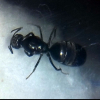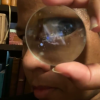Yesterday one of my colonies started to move their brood around from the formicarium to their water test tube, in the out world.
I suspected this was due to humidity on the formicarium starting to go low. It had been some days since I've watered it.
I even saw the queen going outside of her usual nesting place. I've also seen her "packing" a huge pile of eggs and larvae and trying to pick them all up, and that was impressive!
So I've watered the formicarium and the queen stayed in her place. The other 5 nanitics split the time between staying with her and on the test tube taking care of the eggs. There were brood on both places.
Now I've seen no nanitics on the water tube (they're all inside with the queen) but there seem to be still a couple of larvae (from their size they are not eggs) in the tube.
So do eggs, larvae and pupae need different levels of humidity?
Does it makes sense for the small colony (with just 5 nanitics) to have eggs on two such separate and far away places?
Or it's just a reaction time and they'll finally sense the humidity levels by their queen on the formicarium are ok and they'll move back all the brood, eventually?
Thanks for any hint or comment guys!














